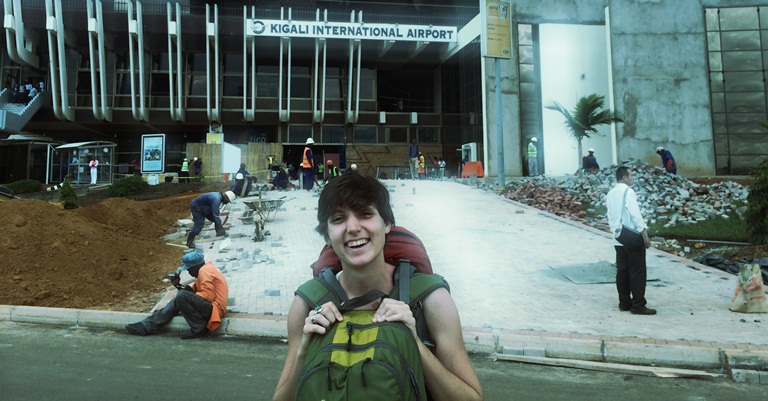Kigali Travel: Failing to Find My Family


There was one problem. I no longer had their contact information.
Following graduation from university, my email account was promptly deleted, and with it, a number of important details that I had failed to export. For seven months leading up to this short trip, I tried to reach them. I scoured the web for their presence, sent requests via LinkedIn, sorted through the notes I scribbled during my original program, and I even sent emails to a blogger who happened to interview my homestay mother on International Women’s Day in 2011.

It all failed. Upon arrival, I simply crossed my fingers and hoped that my homestay mother still worked in the same office, and that she might even enjoy being surprised by a drop-in visit.
Fortunately, both turned out to be true! We reminisced over lunch and planned a dinner at their new home, where I would then surprise my homestay father. The new home was, supposedly, close to their old home that I knew well. I would take the Kigali Bus Service and a local matatu from the hostel where I was staying and call her when I was close by.
But there was another problem.
The entire scheme foundered because of my failure to plan ahead, and to keep track of all the ways in which one can keep in touch.
I failed to get her phone number–and even if I had avoided such a simple and obvious mistake, my SIM card purchased in Uganda was failing to work in Rwanda. I spent the next two hours wandering around the neighborhood, ringing at gates, stumbling through conversations with individuals who only spoke French or Kinyarwanda, and failed to find my family. I visited her office again the next day–just hours before returning to the airport–but was unable to give my apology in person as she was traveling for work.
The entire scheme foundered because of my failure to plan ahead, and to keep track of all the ways in which one can keep in touch. This disappointment, set among the thriving hostel environment where I found myself each night, led me to reflect on the importance of staying connected to those you meet along every journey. Whether a seemingly lasting or fleeting interaction, the people you meet along any adventure provide the most valuable conduit to personal growth. They can make or break your entire experience of a place.
For many who have never traveled to the country, its history can deter–and often translates to low expectations for the potential of the small landlocked country.
And there’s nothing like having paths that once crossed finding their way back together, or like the heart-swelling sensation inspired by a hug between two people reunited. The digital age makes staying in touch an even more seamless endeavor, and I revel in the fact that it can now ensure that shared experiences are rarely lost.
Returning to Kigali also reminded me of all of the wonderful aspects of the city, and its accessibility to travelers, particularly women. For many who have never traveled to the country, its history can deter–and often translates to low expectations for the potential of the small landlocked country. But these low expectations are countered in full force in the country’s flourishing capital. A few things to keep in mind during Kigali travel excursions:
• If you’re traveling with a phone whose service is based in another country, be sure you’ve purchased the roaming credit or planned ahead!
• American citizens aren’t required to purchase a tourist visa for travel in the country, which means you save some dough and time!
• Travel within Kigali is smooth sailing–the landscape makes for pleasant walks on clean sidewalks, public buses crisscross the landscape at a rate of 200 Rwandan francs (about 30 US cents), motorcycle taxis are well-regulated and generally range between 400 to 1000 Rwandan francs (about 60 cents to $1.50), and personal taxis can be hired for all sorts of travel at rates that depend on the number of passengers and the distance traveled.
• English is only spoken by a portion of the population. You’ll easily get by with basic questions and amounts (and many signs are in English), but looking into a few key Kinyarwanda or French phrases might help you out of tough spots!
• You’ll get the best accommodation rates (often including breakfast and WiFi!) at youth hostels for $15-$20 a night, but other options range all the way into luxury standards. Access to the like of supermarkets and movie theaters is the norm, and a range of restaurants are available too–even sushi! Just keep in mind that the farther you get from local food, the higher the price.
• You’ll feel safe throughout the city–streetlights abound, and police are stationed along busy roads.
• You’re within reach of a variety of hikes, gorilla trekking, and other adventures!
• Learning more about Rwanda’s history is essential to approaching the country with an informed perspective. Visiting the Kigali Genocide Memorial is a must, and only solicits suggested donations in place of entrance fees. Directly asking a person about their experience in the conflict or whether they’re a Hutu or a Tutsi, however, is something that should be specifically avoided.
Overall, Kigali is a growing city that has an atmosphere of being on the cutting edge. It defies typical Western expectations and provides a perfect gateway to the attractions of the region. I’ll be sure to return–and next time I’ll keep track of all the ways to keep in touch!
Kigali Travel: Failing to Find My Family photo by Kate Murray.








